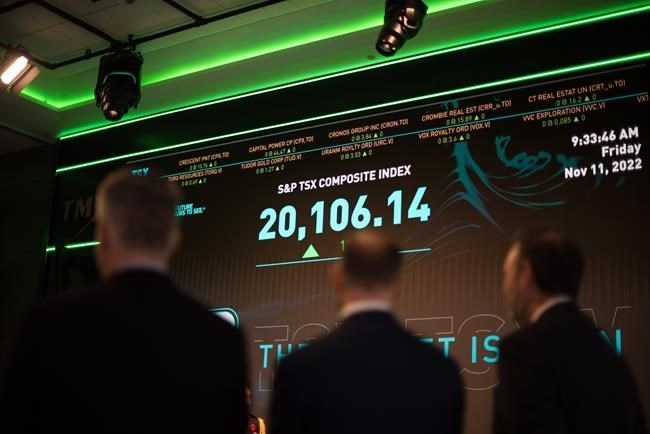TORONTO — Canada's main stock index ended the first day of the trading year up just 0.30 per cent, with losses in energy offset by gains in several other sectors, while U.S. markets were slightly down.
Markets on both sides of the border started the day off on the upside, but started sloping downward soon after the open before levelling out in the afternoon.
The S&P/TSX composite index was up 58.85 points at 19,443.77.
In New York, the Dow Jones industrial average was down 10.88 points at 33,136.37.The S&P 500 index was down 15.36 points at 3,824.14, while the Nasdaq composite was down 79.50 points at 10,386.99.
The themes that drove markets in the latter half of 2022 haven’t gone away with the change of the calendar, said Allan Small, senior investment advisor at iA Private Wealth.
“Right now, the path of least resistance seems to be the negative side. And that's what we're seeing,” he said.
Investors are largely in wait-and-see mode for new data that could help give a sense of central banks’ moves in the first half of 2023, he said.
All eyes will be on the Federal Reserve releasing minutes from its December policy meeting on Wednesday, as well as U.S. jobs data coming later in the week, said Small.
The trend of bad news being good news when it comes to economic data will continue in 2023, said Small; if the jobs data is weaker, markets will see that as a positive sign that interest rate increases are likely to continue slowing.
The Canadian dollar traded for 73.22 cents UScompared with 73.83 cents US on Friday.
The February crude contract was down US$3.33 at US$76.93 per barrel and the February natural gas contract was down 49 cents at US$3.99 per mmBTU.
Though oil prices can have a major effect on the TSX — on Tuesday, the energy index was down 5.82 per cent — the other major sectors like commodities and financials helped lift the index, said Small.
Oil prices have been sensitive recently to any news out of China regarding its reopening and its rising COVID cases.
Small thinks oil prices will start to rise again in the new year, which he said worries him, as oil prices are a big contributor to inflation that central banks can’t influence.
“If we do see oil prices start to rise, as China starts to gain some footing and starts to bring in a lot more energy ... I think we could struggle trying to get inflation down from where we are today,” he said.
The February gold contract was up US$19.90 at US$1,846.10 an ounce and the March copper contract was down four cents at US$3.77 a pound.
This report by The Canadian Press was first published Jan. 3, 2023.
Companies in this story: (TSX:GSPTSE, TSX:CADUSD=X)
Rosa Saba, The Canadian Press



